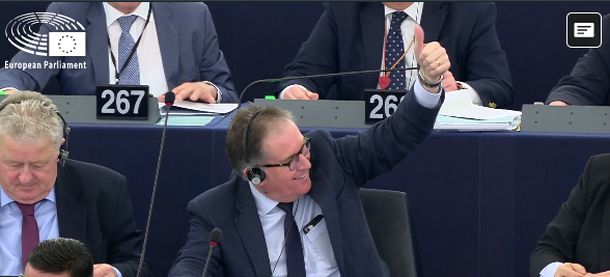SA labour protests Western Sahara inclusion in EU-Morocco deal

A global protest campaign, contesting occupied Western Sahara\'s inclusion in a Morocco-European Union (EU) free trade deal is gaining momentum. Today, South Africa\'s dominant labour union COSATU told the EU it was breaking international law by its planned inclusion of the territory. Afrol News, 17 November 2008.
Published 18 November 2008
A global protest campaign, contesting occupied Western Sahara's inclusion in a Morocco-European Union (EU) free trade deal is gaining momentum. Today, South Africa's dominant labour union COSATU told the EU it was breaking international law by its planned inclusion of the territory. Afrol News, 17 November 2008.
Afrol News,
17 November 2008
COSATU General Secretary Zwelinzima Vavi today personally wrote to the Brussels union, "demanding" that Morocco's "advanced status" within the EU "must exclude Western Sahara." The advanced status to be granted Morocco will increase free trade but also political and cultural cooperation.
So far, the EU has indicated that the occupied territory of Western Sahara will be included in the deal, contrasting its agreement with Israel, where occupied Palestine is excluded, and contrasting the US-Moroccan free trade agreement, which excludes Western Sahara. In the current EU-Moroccan fisheries agreement, Western Saharan seas were included, despite strong protests, giving EU trawlers access to these waters in return for payment to the Rabat government.
COSATU, representing about two million workers in South Africa, is the last among many prominent organisations now joining the global petition demanding that "occupied Western Sahara is specifically excluded from the agreement." COSATU leader Vavi says that if the EU were to include Western Sahara, "through its negotiations with Morocco as the occupying power, it would give an unfortunate sign of support to the unfounded Moroccan claims over the territory. It could also lead to the EU damaging the UN's efforts to decolonise the territory."
The South African labour leader holds that the EU could be breaking international law. "Under International Customary Law, the EU and its member states have a duty of non-recognition of the Moroccan annexation of Western Sahara, and to support the decolonisation of the territory," Mr Vavi says.
COSATU is not the first trade union to join the petition. Also, two of Spain's largest unions, Comisiones Obreras (CCOO) and Unión Sindical Obrera (USO), in addition to unions in Norway and Sweden have joined the fight. Even political parties in Europe, mostly liberal and socialist parties in Scandinavia, have signed the petition.
But for the organisers, the global network Western Sahara Resource Watch (WSRW), the support from outside the EU is of particular encouragement. Ronny Hansen, representing the Norwegian partners behind WSRW, told afrol News that "the support from COSATU and other prominent organisations worldwide is a clear recognition that the petition is a matter of global solidarity, and just an internal EU affair."
"We hope COSATU's support for this petition will inspire organisations and governments in other parts of Africa to join our ranks and express clearer support for the rights of the Sahrawis," Mr Hansen says. "After all, Western Sahara is the only African Union member currently under foreign occupation," he concludes.
News
Here is the EU Council's legal advice on fishing in occupied waters
Before voting on the new EU-Morocco fish deal in 2018, extending into occupied Western Sahara, several EU Member States asked for legal advice that would determine their vote. WSRW today publishes that influential legal opinion, which appears to miss the ball entirely.
05 March 2020
Hans Corell criticizes EU fisheries in Western Sahara
The former Legal Counsel to the UN Security Counsel, Mr. Hans Corell, comments on the EU's fisheries activities in Western Sahara.
20 November 2019
EU Court reaffirms position on Western Sahara
Polisario has a case, but it should be pursued when the time is right, Court implies.
28 February 2019
European Parliament disregards Court and adopts Morocco fish deal
Notwithstanding four consecutive rulings of the EU's highest Court calling such a practice illegal, the European Parliament has just now voted in favour of the EU-Morocco Fisheries Agreement that will be applied to the waters of occupied Western Sahara.
12 February 2019


